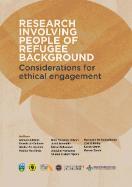Perspectives of refugees on questions of participation, power and ethics in research
Dates: March 2021-June 2022;
Funding Organisation/Programme: IRC, New Foundations & UCD – UoE Strategic Partnership fund Principal investigator: Dr Muireann Ní Raghallaigh, Assoc. Prof. (Social Work)
Background
This study, led by Assoc. Prof. Muireann Ní Raghallaigh, and funded by the Irish Research Council, New Foundations (Strand 1a) scheme and by the University of Edinburgh (UOE) -University College Dublin (UCD) Strategic Partnership, is part of the ‘refugee integration’ stream of the Scottish Irish Migration Initiative, a collaboration between researchers in UCD and the UOE. Following consultation with activists from the Movement of Asylum Seekers in Ireland (MASI) around possibilities of collaboration on refugee integration research, the researchers partnered with MASI and with the Irish Refugee Council under Strand 1a of the New Foundations scheme to explore ethical and collaborative research with refugee populations. Also working on the project were Dr. Zoe O’Reilly and Dr. Karen Smith (UCD) and Dr. Steve Kirkwood of the University of Edinburgh.
Methodology
The project involved a series of focus groups with 9 people of refugee background living in Ireland and Scotland. Each of the participants took part in three focus groups. The discussions were centred on experiences of participating in research or being involved in conducting research with refugees, either as lead researchers or as peer researchers. The discussions also explored how a context-based ethical approach to research might be adopted, an approach where care and respect are to the fore, and which paves the way for an empowering experience for participants of a refugee background.
What questions does it address?
What impacts, both positive and negative, does academic research have on refugees who participate in it How can research be conducted in a way that is non-exploitative and built around an ethics of care and inclusivity? How can ‘engaged research’ be conducted in a way which benefits individuals and communities involved and which is genuinely collaborative and participatory?
Findings
The findings highlight the importance of a sensitive, reflexive and context-based ethical approach, where people of a refugee background are seen as individuals with multiple identities and not simply “sources of data”, and where attention is paid to the rights of participants and the potential impacts of participation. The complexities involved mean that it is vital that all undertaking research of this nature - including academic researchers, students, journalists, policy researchers and NGO employees:
- have the appropriate knowledge and skills. In particular, an awareness of, and attention to, complex ethical issues (including informed consent and its subtleties) is vital, as is an understanding of what is involved in working with participants who have experienced mental health difficulties or trauma, and the complexity of working cross culturally.
- understand fully the need to ensure that research happens in a considered, sensitive and culturally appropriate way, as well as in a way that is empowering and inclusive for all involved.
Outputs

Following analysis of the data from the first two focus groups, a Briefing Paper was drafted and this was then discussed and edited in the final focus groups. The final version, entitled ‘Research Involving People of a Refugee Background: Considerations for Ethical Engagement’ focuses on what researchers should consider before, during and after data collection when conducting research.
The co-authors are: Ahmad Albtran, Shawki Al-Dubaee; Heidar Al-Hashimi; Matida Nasi Beja; Neo Florence Gilson; Azad Izzeddin, Steve Kirkwood; Abdulai Mansaray; Sharon Dalani Mpofu; Muireann Ní Raghallaigh; Zoe O’Reilly; Karen Smith and Marwa Zamir. The Briefing Paper was launched at a public Webinar, the format of which was designed collaboratively with the participants in the study. The participants in the research spoke at the webinar, summarising key aspects of the Briefing Paper, discussing their own experiences of research and responding to questions posed by the attendees.
Impact
The Briefing Document has been downloaded from the UCD Research Repository website 472 times across six world regions. The Webinar and Briefing Document have received excellent feedback from academics and researchers and from NGO staff. Comments on social media, via email and in the chat function during the webinar indicated that those who attended found the webinar thought provoking and informative and indicated that the publication will influence how they conduct research with refugee populations in the future. A future similar output is likely to focus more specifically on the involvement of refugees as researchers or peer researchers within refugee-related research projects. In addition, a paper for Forced Migration Review is in the process of being written, with a focus on collaborative and inclusive research with refugee populations.
